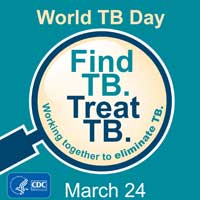March 24th has been designated  globally as “World TB Day”. The event began in 1982 is sponsored by the World Health Organization and the International Union Against Tuberculosis and Lung Disease and is intended to raise awareness that anyone can contract TB to make health professionals aware of the importance of testing people for the disease.
globally as “World TB Day”. The event began in 1982 is sponsored by the World Health Organization and the International Union Against Tuberculosis and Lung Disease and is intended to raise awareness that anyone can contract TB to make health professionals aware of the importance of testing people for the disease.
This date was chosen to celebrate the discovery by Dr. Robert Koch of the Mycobacterium tuberculoisis (the bacteria that causes tuberculosis) in 1882. This important discovery was the beginning of the steps being taken to control and hopefully one day eradicate the disease. Unfortunately, TB is still one of the leading causes of death around the world.
Tuberculosis (TB) is a contagious bacterial disease that affects mainly the lungs but can also affect the kidneys, brain and the spine. Signs and symptoms may include:
• Coughing up blood
• Fatigue
• Fever
• Chills
• Night sweats
• Loss of appetite
• Pain with breathing
TB is spread by coming into contact with the airborne droplets of the bacteria from an infected person. People most susceptible are those who have compromised immune systems and include people undergoing chemotherapy, have diabetes, are very young or very old, and have HIV/AIDS. There are antibiotics that given to fight the disease but depending on the strain and their resistance to treatment, may require months or years of treatment.
A routine physical usually includes a TB skin test. If you would like to schedule a physical exam and a TB test with one of our physicians, please call 718-670-5486.
All content of this newsletter is intended for general information purposes only and is not intended or implied to be a substitute for professional medical advice, diagnosis or treatment. Please consult a medical professional before adopting any of the suggestions on this page. You must never disregard professional medical advice or delay seeking medical treatment based upon any content of this newsletter. PROMPTLY CONSULT YOUR PHYSICIAN OR CALL 911 IF YOU BELIEVE YOU HAVE A MEDICAL EMERGENCY.

